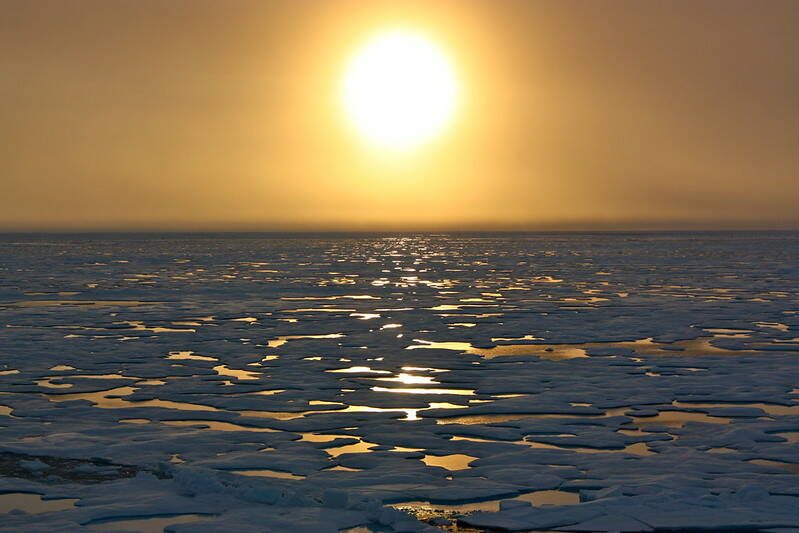As a scorching wake-up call reverberated around the globe, climate scientists urged accelerated action in the Arctic to help slow the rate of warming and keep the 1.5° C guardrail within reach.
A new research report urges the countries that are members of the international group the G20, to take urgent action to preserve and understand the Arctic’s role in climate warming, and highlights the urgency and necessity of immediately cutting back “short-lived climate pollutants” black carbon and methane. The report was from the ThinkTwenty, or T20, a group that is officially recognized by the G20 and brings think tanks and high-level experts to consider policy issues.
As a backdrop to the T20 Summit meeting in India this week, the report – “The Consequences of Arctic Amplification in a Warming World” – explains the amplification that occurs from interlocking effects causing the Arctic to warm four times faster than the global average. Amplification has caused the Arctic’s reflective sea ice to shrink and the amount of heat going into the ocean to increase, causing more ice to melt in a self-amplifying feedback loop.
In the Arctic, black carbon warms the atmosphere and blackens the snow and ice, reducing reflectivity, which increases the rate at which snow and ice melt. Black carbon, which results from the incomplete combustion of fossil fuels, is the strongest light-absorbing component of particulate matter and is a critical contributor to human-induced climate heating, especially in the Arctic, where the impact of black-carbon emissions is magnified.
Permafrost thaw is another self-amplifying feedback loop accelerated by Arctic warming, leading to release of carbon dioxide, or CO2; methane; and nitrous oxide into the atmosphere, which causes further warming. Unless checked, “permafrost thaw could release climate pollutants equivalent to the remaining carbon budget of the 1.5°C target,” the report says.
Effects can be seen across the globe from Arctic-related climate changes. Declines in summer Arctic sea ice correlate with the extremely strong summer monsoons in India, and the loss of Arctic sea ice in the Chukchi Sea has been linked to increased heat waves in California, the study says of these effects, calling them “teleconnections.” In addition to these global effects, the rapid warming of the Arctic also threatens the livelihoods and cultures of Arctic Indigenous peoples, who have been trying to warn the world about their melting homeland for years.
“To reduce the rate of Arctic warming and respond to the near-term climate emergency, the G20 should implement fast-acting strategies that cut non-CO2 super pollutants, particularly short-lived climate pollutants (SLCPs), including methane, black carbon, hydrofluorocarbon, and tropospheric ozone, which can slow warming in the near term and slow the loss of Arctic sea ice,” the report says.
“Cutting non-CO2 super-pollutants, rather than solely targeting CO2, can slow warming four times faster, avoiding up to .6C of warming by 2050 and up to 1.2°C by 2100. These measures can reduce the rate of warming in the Arctic by two thirds.”
The report urges that the International Maritime Organization’s ban on heavy-fuel oil use in the Arctic for some ships from July 2024, with waivers and exemptions for others until 2029, should take effect sooner to minimize the rapid rate of warming in the Arctic. Without the waivers/exemptions, the heavy fuel oil ban could reduce black carbon emissions by up to 30%.
The T20 summit comes as Earth’s hottest days ever recorded commanded new attention to the urgency of scaling up renewable energy and phasing out fossil fuels.
Speaking at UN Headquarters July 27, Secretary-General Antonio Guterres warned that “the era of global warming has ended” and “the era of global boiling has arrived.”
“Climate change is here. It is terrifying. And it is just the beginning,” the UN chief said. “We can still stop the worst. But to do so we must turn a year of burning heat into a year of burning ambition.”
Guterres called on the G20 leading industrial nations, responsible for 80% of global emissions, to set new national emissions targets and urged all countries to push to reach net zero emissions by mid-century.
He said all actors must unite to accelerate the just and equitable transition from fossil fuels to renewable energy, while stopping oil and gas expansion and phasing out coal by 2040.
• Kay Brown is Arctic policy director for Pacific Environment, based in Anchorage. She is a former director of the Division of Oil and Gas for the state of Alaska and a former Alaska state representative. This column was originally published by the Alaska Beacon, an affiliate of States Newsroom, an independent, nonpartisan news organization focused on connecting Alaskans to their state government.

